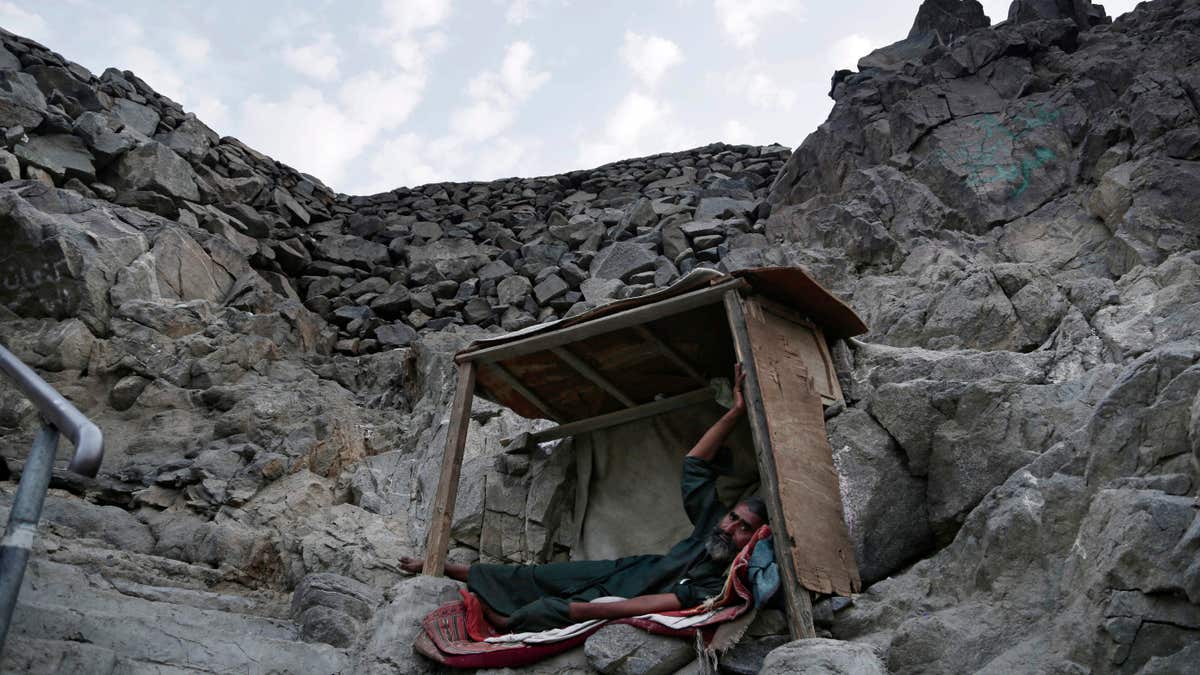
In this Friday, Sept. 9, 2016 photo, a Pakistani beggar who sleeps on Noor Mountain, where Prophet Muhammad received his first revelation from God to preach Islam, poses for a portrait, on the outskirts of Mecca, Saudi Arabia. (AP)
MECCA, Saudi Arabia – Just outside the city of Mecca in Saudi Arabia lies one of Islam's most important historical sites — a cave where, according to tradition, the Prophet Muhammad spent time in seclusion, contemplation and self-reflection.
It was here, inside Hira Cave located near the top of a steep hill called Noor Mountain, where Muslims believe God revealed to the prophet the first verses of the Quran through the angel Jebril, or Gabriel as he is named in English.
Today, the site is among few still preserved from the prophet's time — with help from Pakistani workers in the kingdom.
Each year, observant Muslims deepen their prayers and supplication in the final 10 nights of the Islamic month of Ramadan, believing that it was during this time some 1,400 years ago that the miraculous revelation took place on Noor Mountain, also known as the "Hill of Light."
The hill itself is not part of the annual hajj pilgrimage, but its location so close to the holy city of Mecca and its significance as a place of enlightenment draws thousands of pilgrims here every year.
But present-day visitors encounter a markedly different summit from the one the prophet experienced.
For starters, there are now more than 1,000 steps that guide pilgrims up the rocky hill to the secluded cave. Along the way, entrepreneurial Pakistanis sell bottled water, snacks and tea to pilgrims exhausted by the climb.
Unlike the quiet and seemingly endless stretch of nature the prophet would have seen from the cave, massive high-rises housing five-star hotels jut into the distant skyline just steps away from the cube-shaped Kaaba, Islam's holiest site.
The Pakistani workers and beggars who live off the mountain's draw say they play a key role in helping to preserve it.
Nizam Din, from the Pakistani city of Quetta, spends his days begging and fixing broken cement steps along the path up Noor Mountain. Jamal Khan, from Karachi, Pakistan's largest city and main port, also earns a living by serving the pilgrims who make their way to the cave.
"Our lives here are better because we do not have jobs back home," he said. "What is a better place to be than here where the Prophet Muhammad received his first revelation from God?"
Mecca's mayor, Osama al-Bar, says the municipality ensures the area's cleanliness. There are also plans, he said, for the development of a visitors' center near the hill to explain to people its significance and history.
He said the area is watched over by the kingdom's religious police, known as the Commission for the Promotion of Virtue and Prevention of Vice, who ensure visitors do not turn it into a place of worship that venerates anything other than God.
Here is a selection of images by Associated Press photographer Nariman El-Mofty showing the Pakistanis who work on Noor Mountain.







































